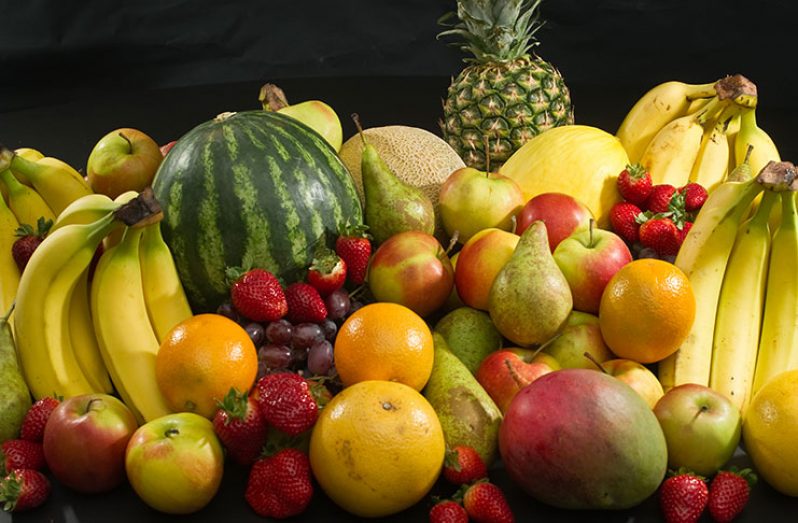…. Resist the lure of simple sugar and sugar-coated snack foods
EVER happened to be in a rush and forgot to pick up fruits from any of the municipal markets to take for your patient who’s hospitalised at the Georgetown Public Hospital (GPHC)?
Then you’ll know how difficult, nay, impossible it is to get fruits to buy at any of the 12 or 15 mini stalls operated by vendors outside of the hospital compound. Except for about two or three of them selling coconut water at stands along New Market Street and other neighbouring stands, there is no other facility offering fruits for sale.
But perhaps, they are only operating within their means, since other fruit vendors at the Stabroek Market for example, claim that the intense heat of the sun has adverse effects on the fruits they put up for sale. Bananas for example, quickly become black when exposed to the sun, they contend.
From a distance, the colourful and well-displayed items for sale in the showcases could almost exert a magnetic pull you. But getting closer, one will find that they are stocked with an array of sweet beverages of all colours, sizes and preparations. There are, for example, high-sugar content carbohydrates snacks such as caramels, chocolate, sweet biscuits and other high sugar-coated snack foods made of refined flowers. Unlike those simple processed sugars, complex carbohydrates – the starch and fibre found in fruits, vegetables and unprocessed foods, generate the body’s energy.
Unless used in moderation, the snack foods currently on display and which will inevitably be given to patients by their relatives and friends, create further problems for persons who are already sick and battling disease conditions.
The body converts the excess sugar and from ‘simple sugar’ (snack) foods into fat which is deposited into the body’s tissues, hence can cause the users to gain weight. Overweight people have heightened incidences of heart disease and strokes since extra fat puts pressure on the heart, lungs, and other internal organs. It robs energy and life quality in a number of ways. Obesity can also cause stoppage, clogging, congestion, and obstruction.
And for people who are diabetics and have a difficulty producing or effectively using insulin which is necessary, it results in an elevation of blood sugar levels. Insulin is a hormone made by the pancreas that allows your body to use sugar (glucose) from carbohydrates in the food that you eat for energy or to store glucose for future use. Insulin helps keeps your blood sugar level from getting too high (hyperglycemia) or too low (hypoglycemia).
Uncontrolled blood sugar elevation can, in time result in serious complications such as:
• Problems in the eyes (diabetic retinopathy), which is the depletion or death of the cells responsible for supporting and feeding the retina (the eye component sensitive to light).
• Kidney problems (diabetic nephropathy). The lesions in the small capillaries of the kidneys cause a progressive loss of their capacity to filter and eliminate the toxic products of the body. This results in renal failure.
• Diabetic neuropathy: Problems involving the nerves: The lesions of large and small capillaries which in turn cause damage to the nerves. The brain is connected to the muscles, the skin and all the organs through an extensive network of nerves which carry messages and orders back and forth. Symptoms of diabetic neuropathy include:
– Sexual impotence; lessening or absence of vaginal lubrication; a tingling sensation on the feet; numbness of the feet; unsteady walk; muscle weakness.
Fruits and vegetables are naturally low in calories. They may reduce the risk of disease. Eating plenty of fruits and vegetables may help reduce the risk of many diseases, including heart disease, high blood pressure, and some cancers.
THE IMPORTANCE OF FRUITS IN YOUR DAILY DIET
Eating fruit provides health benefits — people who eat more fruits and vegetables as part of an overall healthy diet are likely to have a reduced risk of some chronic diseases and cancers. Fruits provide nutrients vital for health and maintenance of one’s body.
Most fruits are naturally low in fat, sodium, and calories and have no cholesterol. Fruits are sources of many essential nutrients including potassium, dietary fibre, vitamin C, and folate (folic acid) which helps the body form red blood cells.
Fiber-containing foods – fruits such as mangoes, golden apples, pineapples, help provide a feeling of fullness and yet have fewer calories. Vitamin C is important for growth and repair of all body tissues. It helps heal cuts and wounds and keeps teeth and gums healthy.
Dietary fibre from fruits helps reduce blood cholesterol levels and may lower risk of heart disease. It is important for proper bowel function; helps reduce constipation and diverticulosis and heals cuts and wounds. It also keeps teeth and gums healthy.



.jpg)








